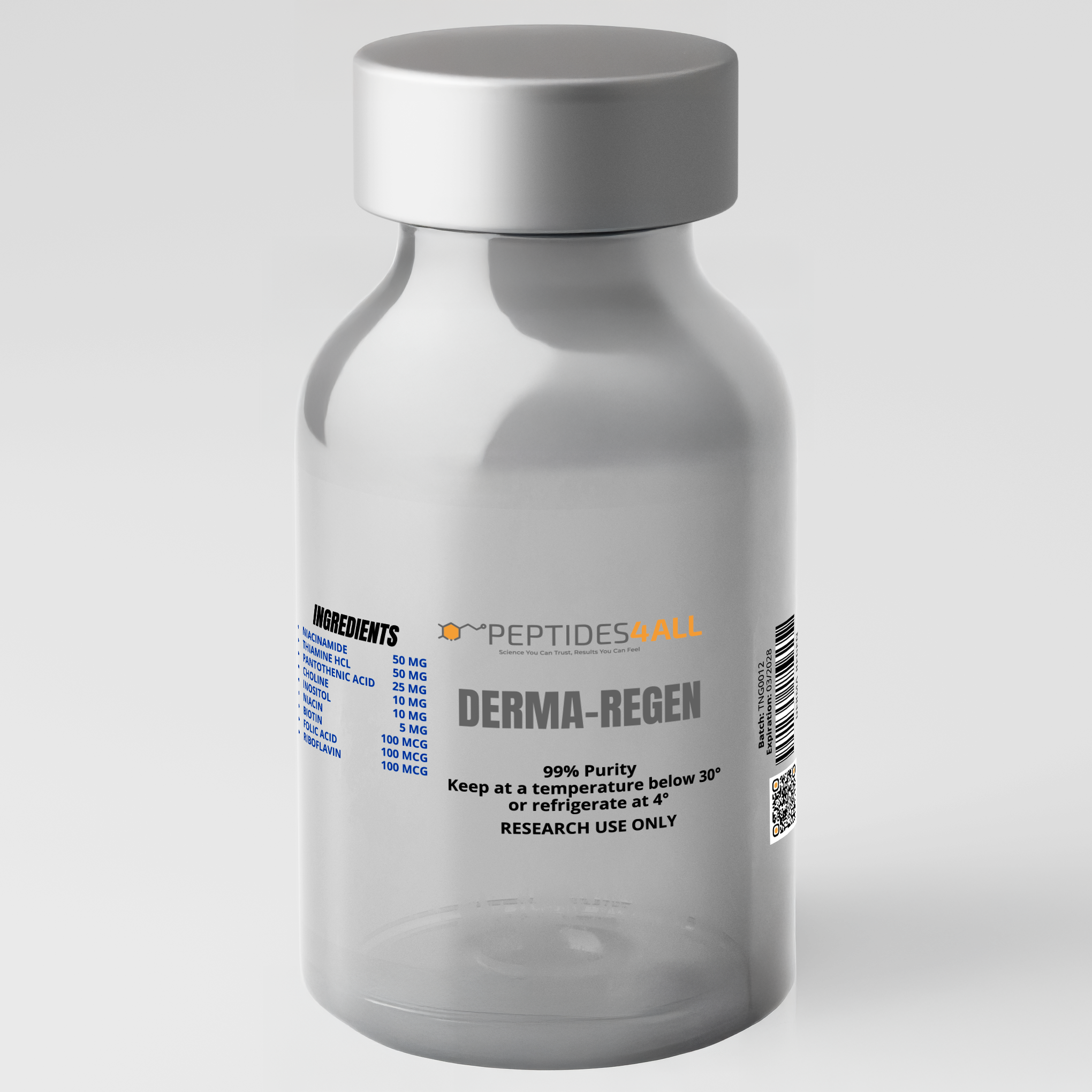PEPTIDES4ALL DERMA-REGEN – Intramuscular Dermatologic & Skin Renewal Blend
DERMA-REGEN is a sterile intramuscular (IM) injectable formulation combining a spectrum of B-vitamins and related compounds designed to support skin repair, barrier function, cellular energy, and dermatologic resilience. Formulated for research use only, this blend is intended for preclinical and in vivo/in vitro studies probing the intersection of micronutrient support and skin health under stress, aging, or damage paradigms.
Composition (per dose):
-
Niacinamide 50 mg
-
Thiamine HCl 50 mg
-
Pantothenic Acid (Vitamin B5) 25 mg
-
Choline 10 mg
-
Inositol 10 mg
-
Niacin (Vitamin B3) 5 mg
-
Biotin 100 µg
-
Folic Acid 100 µg
-
Riboflavin (Vitamin B2) 100 µg
Scientific Evidence & Research Findings
Niacinamide (50 mg) / Niacin (5 mg)
-
Niacinamide (vitamin B3) is well studied in dermatology for its barrier-repair, anti-pigmentation, anti-inflammatory, and antioxidative effects. MDPI+3PMC+3PMC+3
-
Clinical trials using topical 4% niacinamide showed reduction in hyperpigmentation (melasma), reduced inflammation, and improved skin appearance. PMC
-
Niacinamide also modifies NF-κB and MAPK signaling, suppressing cytokines like IL-8, IL-6, TNF-α in keratinocytes under stress or UV insult. PMC+1
-
Niacinamide has been associated with improved skin hydration via increased ceramide synthesis and barrier lipids. MDPI+3DermNet®+3ScienceDirect+3
-
A high-quality trial of nicotinamide (oral) in humans reduced incidence of new non-melanoma skin cancers by ~23% in high-risk patients. UNSW Sites
B-Vitamin Complex (Thiamine, Pantothenic Acid, Riboflavin, Biotin, Folic Acid, Choline, Inositol)
-
B vitamins are essential cofactors in energy metabolism (e.g. NAD, FAD, CoA), nucleotide synthesis, methylation, and cellular repair pathways. pagepress.org+3Consensus+3PMC+3
-
In dermatology reviews, the vitamin B group is discussed as supportive in acne, dermatitis, and general skin homeostasis, though often in oral or topical contexts rather than injected forms. PMC+2PubMed+2
-
Riboflavin and folate are vital for repair of oxidative damage and cellular replication in skin cells. PMC+1
Key Research Benefits & Applications
-
Barrier & Repair Support: Niacinamide plus B vitamins may provide substrates for DNA repair, lipid synthesis (ceramides), and antioxidant resilience in skin tissue under oxidative or UV insult.
-
Energy & Biosynthesis: The B vitamin complex supports mitochondrial metabolism, coenzyme function (NAD, FAD, CoA), and anabolic pathways necessary for cell renewal.
-
Anti-Inflammatory & Redox Regulation: Niacinamide modulates inflammatory pathways and reduces oxidative stress in epidermal and dermal cells; cofactor vitamins further support redox enzymes.
-
Synergistic Blend: The combination is intended to deliver a broader coverage across multiple biochemical pathways that influence skin quality and resilience, beyond what a single vitamin can accomplish.
Formulation, Handling & Storage
- Formulation: Sterile, preservative-free IM injectable solution
- Administration: Intramuscular injection (e.g. deltoid, gluteal) under sterile technique
- Storage: –20 °C, shielded from light and moisture; handle under lab protocols
Intended Use
For research purposes only. Must be handled in accordance with institutional protocols and ethical guidelines.
